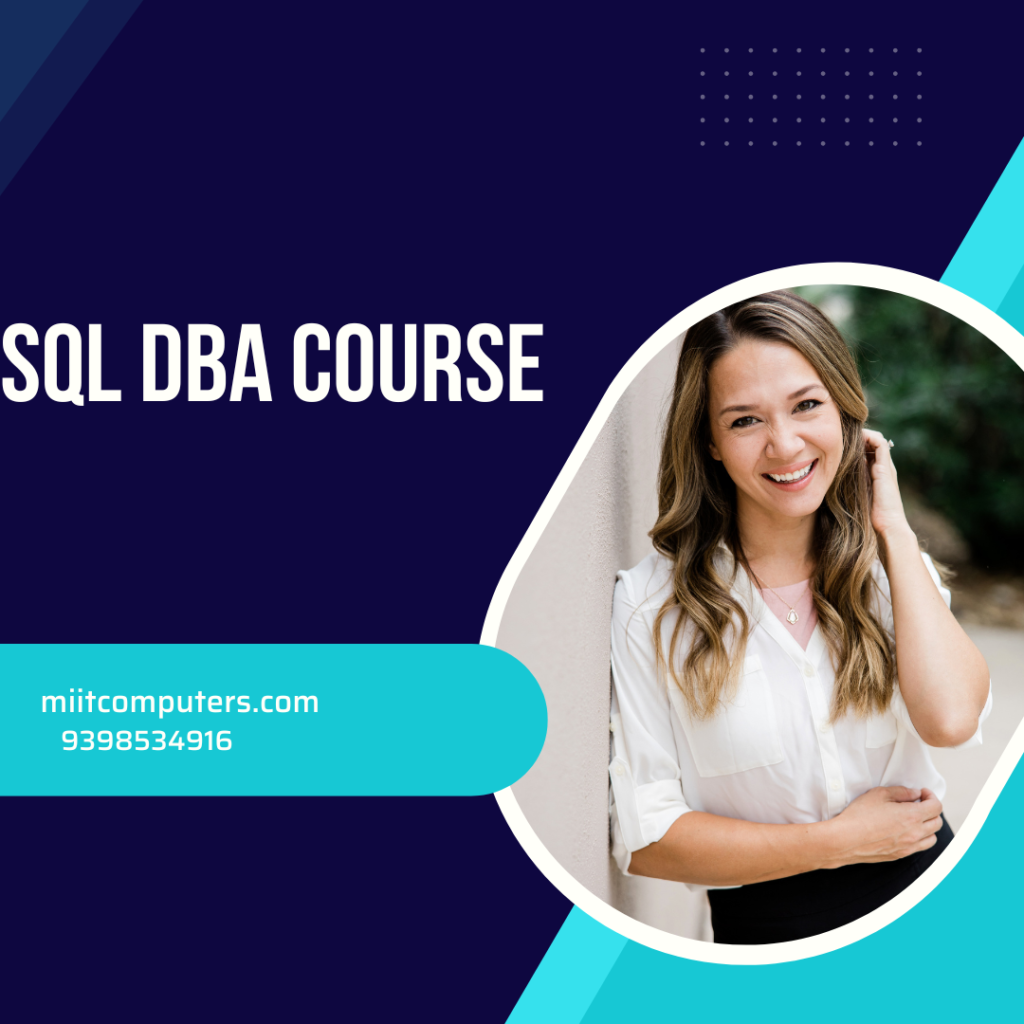You’re right to specify “SQL Server” DBA! While “SQL DBA” often implies Microsoft SQL Server, being explicit is always better. Here’s a course description tailored specifically for a SQL Server DBA course, keeping in mind the context of Hyderabad:
Course Description: Comprehensive Microsoft SQL Server Database Administration
This intensive Microsoft SQL Server Database Administration (DBA) course is designed to equip IT professionals in Hyderabad with the essential knowledge and practical skills required to effectively manage and maintain Microsoft SQL Server environments. Through a balanced approach of theoretical concepts and hands-on labs, you will gain expertise in installing, configuring, administering, securing, monitoring, and troubleshooting SQL Server instances and databases. This course delves into critical DBA responsibilities, including implementing robust backup and recovery strategies, optimizing database performance, ensuring high availability and disaster recovery, managing security protocols, and automating routine administrative tasks. By the completion of this course, you will be proficient in managing the day-to-day operations of SQL Server environments, contributing to the reliability, performance, and security of your organization’s vital data infrastructure.
Upon successful completion of this course, participants will be able to:
- Plan and execute the installation and configuration of SQL Server and its associated tools.
- Understand the underlying architecture of SQL Server and its key components.
- Create and manage databases, filegroups, and transaction logs effectively.
- Develop and implement comprehensive backup and recovery strategies to safeguard critical data.
- Implement and manage robust security measures, including logins, users, roles, and permissions.
- Proactively monitor SQL Server performance and identify potential bottlenecks.
- Apply various performance tuning techniques, including index management and query optimization.
- Design, implement, and manage high availability (HA) and disaster recovery (DR) solutions such as Always On Availability Groups, 1 mirroring, and log shipping.



- Automate routine administrative tasks using SQL Server Agent jobs and maintenance plans.
- Perform data transfers and integration using appropriate tools and techniques.
- Troubleshoot and resolve common SQL Server issues and errors efficiently.
- Apply industry best practices for SQL Server administration and maintenance in a real-world context.
- Gain an understanding of cloud-based SQL Server offerings like Azure SQL Database (depending on the course specialization).

Course Outline (Typical Modules):
The specific modules and their sequence may vary depending on the training provider, but a comprehensive Microsoft SQL Server DBA course typically covers the following:
Introduction to SQL Server Architecture and Concepts:
- Overview of SQL Server editions and features.
- Understanding relational database management system (RDBMS) principles.
- Deep dive into SQL Server architecture, including the relational engine and storage engine.
- Introduction to SQL Server Management Studio (SSMS) and other essential tools.
SQL Server Installation and Configuration:
- Planning considerations for SQL Server deployment.
- Step-by-step installation of SQL Server and its components.
- Configuring server-level settings and network protocols.
- Managing SQL Server services and their dependencies.
Database Management and Storage:
- Creating, altering, and dropping databases.
- Understanding system databases and their importance.
- Managing data files, log files, and filegroups for optimal storage management.
- Implementing database options and configurations.
Security Administration in SQL Server:
- Understanding authentication and authorization mechanisms.
- Managing server principals (logins) and database principals (users).
- Implementing server and database roles for granular access control.
- Granting and revoking permissions on database objects.
- Implementing security best practices and auditing SQL Server events.
Backup and Recovery Strategies:
- In-depth understanding of SQL Server recovery models (Simple, Full, Bulk-Logged).
- Performing various types of backups (full, differential, transaction log).
- Developing a comprehensive backup strategy tailored to business needs.
- Restoring databases from different backup types, including point-in-time recovery.
- Verifying backup integrity and implementing restore testing procedures.
Performance Monitoring and Tuning:
- Utilizing performance monitoring tools like Activity Monitor and Performance Monitor.
- Identifying and analyzing performance bottlenecks (CPU, memory, disk I/O).
- Understanding and managing indexes for efficient data retrieval.
- Maintaining database statistics for query optimizer accuracy.
- Analyzing query execution plans to identify optimization opportunities.
- Using the Database Engine Tuning Advisor for performance recommendations.
- Diagnosing and resolving blocking and deadlocking scenarios.
Implementing High Availability and Disaster Recovery (HADR):
- Comprehensive overview of HADR concepts and technologies in SQL Server.
- Planning, configuring, and managing Always On Availability Groups for automatic failover.
- Implementing and managing database mirroring for redundancy.
- Configuring and managing log shipping for disaster recovery.
- Understanding Windows Server Failover Clustering (WSFC) and its role in HADR.
Automation and Routine Maintenance:
- Introduction to SQL Server Agent and its capabilities.
- Creating, scheduling, and managing SQL Server Agent jobs for automation.
- Implementing database maintenance plans for routine tasks like backups, integrity checks, and index maintenance.
- Configuring alerts and notifications for critical database events.
Data Transfer and Integration Techniques:
- Utilizing tools like the Import and Export Wizard,
bcputility, andBULK INSERTfor data transfer. - Introduction to SQL Server Integration Services (SSIS) for more complex ETL processes (may be a separate module or course).
- Utilizing tools like the Import and Export Wizard,
Troubleshooting and Error Resolution:
- Identifying and resolving common SQL Server errors and issues.
- Utilizing SQL Server error logs and system event logs for diagnosis.
- Troubleshooting connectivity problems and resource-related issues.
- Diagnosing and addressing database corruption.
Target Audience:
This course is specifically designed for individuals in Hyderabad and beyond who are:
- Aspiring Microsoft SQL Server Database Administrators.
- Existing Database Administrators looking to deepen their SQL Server expertise.
- System Administrators responsible for managing SQL Server environments.
- Developers seeking a comprehensive understanding of SQL Server administration best practices.
- IT professionals aiming to enhance their skills in database management and administration within the Microsoft ecosystem.
Prerequisites:
While not always strictly enforced, a foundational understanding of relational database concepts and basic familiarity with SQL querying can be beneficial for maximizing the learning experience.
By enrolling in a comprehensive Microsoft SQL Server DBA course, you will gain the practical skills and in-depth knowledge necessary to effectively manage and maintain critical SQL Server infrastructure, a highly sought-after skill in the thriving IT landscape of Hyderabad. Remember to review the specific syllabus and instructor qualifications of any course you consider to ensure it aligns with your individual learning objectives and career aspirations.